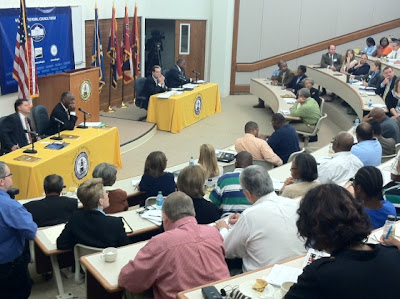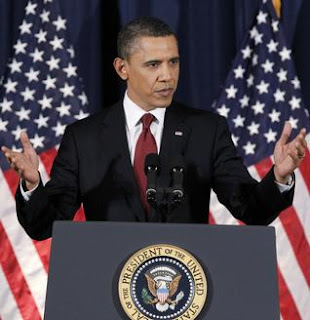President Obama Meets with World Leaders on Day Two at the U.N General Assembly
President Obama distinct the 19th anniversary of the International Day of Peace with a series of meetings and events as he participated in the 66th session of the United Nations General Assembly in New York City. The President began his day with an address to the General Assembly, where he spoke about the significant changes that have occurred throughout the world since the last gathering of this group:
This year has been a time of unexpected transformation. More nations have stepped forward to uphold international peace and security. And more individuals are claiming their universal right to live in freedom and dignity.
Following the address, President Obama met with Prime Minister Netanyahu of Israel and pledged America’s commitment to the pursuit of peace in the Middle East. The Prime Minister decided with President Obama's assertion that direct negotiations between Israel and Palestine are the only way to achieve that goal:
I think the Palestinians want to attain a state through the international community, but they’re not equipped yet to give peace to Israel in return. And my hope is that there will be other leaders in the world, responsible leaders, who will heed your call, Mr. President, and oppose this effort to shortcut peace discussions in fact, to avoid them. Because I think that avoiding these negotiations is bad for Israel, bad for the Palestinians, and bad for peace.
The President had his first face to face meeting with Japan's new Prime Minister, Yoshihiko Noda. The two leaders discussed the ongoing recovery from the earthquake and tsunami that overwhelmed that country earlier this year, and the importance of the strong Japan-U.S. relationship. The Prime Minister echoed the President’s desire to uphold this vital partnership:
17 Years After Violence Against Women Act, Vice President Calls on New creation to Take Action
Posted by
White House
Last night, Vice President Biden and Dr. Jill Biden held a reception at the Naval Observatory to rejoice the 17th anniversary of the Violence Against Women Act (VAWA) being signed into law, as well as call on a new generation to take action to decrease the high rates of violence and assault that continues to threaten young men and women across the country.
Speaking before a crowd that incorporated many of the men and women who supported the Vice President’s efforts to see the Act become law on September 13, 1994, the Vice President remarked on how it was VAWA that exposed a “flaw that lay as part of the fabric of American society”– the fact that the mere discussion of violence and abuse being committed against women was measured by many to be taboo.
Beyond shattering this notion, the law redefined the way domestic violence is handled from side to side changes in law enforcement, improvements in the criminal justice system and the establishment of shelters and services for victims.
Working Jointly to Create World-Class Schools
Posted by
White House
Now that our nation’s children are back in school, I will be travelling through six states with this important message: our nation’s long-term economic security is inextricably linked to education. We have to educate our way to a enhanced economy.
The jobs of today and tomorrow will need knowledge workers with some post secondary training, whether it is an associate or bachelor’s degree, or technical training obtainable from a vocational school or community college.
Unfortunately, America has a long way to go before we can truly say we’re educating today’s children to be competitive in the knowledge economy. By many indicators, we’re falling far short.
The Obama administration has a cradle-to-career agenda to support states and districts as they reform their schools and make college more affordable for students. This agenda is intended around key principles, including:
* Creating premature learning systems that align all of their resources to get our youngest children ready for kindergarten.
* Raising standards so they really prepare students for success in college and careers.
* Improving the quality of teaching in the classroom by improving the preparation, professional development, and estimate of teachers and principals.
* And turning around determinedly low-performing schools that have been failing students for decades or even generations.
It’s an aggressive agenda, and we’re backing it up with unprecedented investments in reform. We’ve already made the largest investment in higher education since the GI Bill. We’re creating new incentives for states to align their early learning programs to make certain all children are ready for kindergarten. Through Race to the Top, states have made more progress in reform over the past two years than in the previous decade. And the President has a plan to fix No Child Left Behind by offering states suppleness from its one-size-fits all mandates.
Nevertheless, reform will occur in states and communities. Our job in Washington is to give resources and support for the excellent work happening in states and communities.
That’s why I’m so keyed up about this week’s bus tour. All across the Midwest, members of my team will be visiting communities where elected officials, union leaders, business owners, and teachers are working jointly to transform the lives of children.
President Obama on the Anniversary of Hurricane Katrina
Posted by
White House
Today, as cities and towns all along the East Coast begin to recover from the destructive power of Hurricane Irene, we as well reflect on the six year anniversary of Hurricane Katrina. Both storms tell again us of the need to take precautions and be prepared before disasters strike. Ready.gov and Listo.gov are resources with easy-to-follow steps on how to plan in front for disasters that might affect your area.
In a statement observing the anniversary of Hurricane Katrina, the President highlighted the importance of attractive our preparedness efforts and the Administration's commitment to supporting communities as they rebuild:
Six years ago today, Hurricane Katrina struck the Gulf Coast, upending families and ravaging communities – and no one will not recall the tragic events of those days. But what’s obligatory of us is more than remembrance – what’s required of us is our continued efforts to make sure that New Orleans and the Gulf Coast fully recover, and to make sure that our reply to such disasters is the best it can possibly be.
White House Rural Council Roundtables on Job Growth
Posted by
White House
Last week, as part of his three day bus tour, President Obama stopped in Peosta, Iowa to take part in the White House Rural Economic Forum, where he announced a series of initiatives that leverage existing programs and funding to help small businesses and meet the critical needs in rural communities. In the coming weeks, the President will put forth additional proposals that will help put people back to work and give the middle class greater economic security. Promoting financial and job growth in rural communities is central to these goals.
Earlier this week, I traveled to Louisiana, Tennessee and Arkansas through Federal Co-Chairman of the Delta Regional Authority (DRA) Chris Masingill and Doug O'Brien, Deputy Under Secretary for Rural Development at the U.S. Department of Agriculture to conduct project site visits and contribute in White House Rural Council Roundtables in Houma and Bastrop, LA as well as Pine Bluff, AR. We heard from stakeholders in the region about how the federal government has and can be a better partner as we invest in rustic economies.
On August 26, 2011, U.S. Commerce Department’s Economic Development Administration (EDA) will host a webinar to talk about best practices to promote rural small business development. White House Rural Council members Chris Masingill of DRA and Federal Co-Chairman of the Appalachian Regional Commission (ARC) Earl Gohl will share best practices and successes with secure to 400 participants.
Entrepreneur All-Stars Join the Startup America Partnership
Posted by
White House
This past January, President Obama called on both the Federal government and the confidential sector to radically increase the success of high-growth entrepreneurs, who are creating jobs and fueling modernism across the country. To help increase their success, the White House-led Startup America proposal has rolled out new policies to benefit fledgling companies (including new efforts to attract and retain immigrant entrepreneurs) in tandem with the independent Startup America Partnership, which has been hard at work mobilizing the private sector to “raise the entrepreneurial game of the United States.”
Today the Startup America Partnership announced two main new developments. First, they appointed their first slate of founding board members, who stand for some of America’s most successful entrepreneurs. The board includes Fred Smith, who came up with the thought for FedEx in a college economics class; Lynn Jurich, who grew SunRun into one of the nation’s leading home solar companies in just the last four years; and Earvin “Magic” Johnson, who has built up Magic Johnson Enterprises and the Magic Johnson Foundation because retiring from the NBA. The full current schedule of board members includes:
President Obama on Libya: The future is in the Hands of its People
Posted by
White House
This afternoon, following a call with the National Security Council, President Obama spoke about the evolving circumstances in Libya. Over the past six months, the United States has worked with associates to protect the people of Libya from Muammar Qaddafi's brutality and support them as they seek the opportunity for the citizens of Libya to decide their own destiny. Today, President Obama said, "The Qaddafi regime is coming to an end, and the future of Libya is in the hands of its people," making it clear that the bravery of the Libyan people has brought freedom within reach:
Earlier this year, we were enthused by the peaceful protests that broke out across Libya. This basic and joyful longing for human freedom echoed the voices that we had heard all across the region, from Tunis to Cairo. In the face of these protests, the Qaddafi regime responded with brutal crackdowns. Civilians were murdered in the streets. A campaign of aggression was launched against the Libyan people. Qaddafi threatened to hunt peaceful protestors down like rats. As his forces higher across the country, there existed the potential for wholesale massacres of blameless civilians.
In the face of this aggression, the international community took action. The United States helped shape a U.N. Security Council declaration that mandated the protection of Libyan civilians. An unprecedented coalition was formed that built-in the United States, our NATO partners and Arab nations. And in March, the international community launched a military operation to save lives and stop Qaddafi’s forces in their tracks.
In the early days of this involvement the United States provided the bulk of the firepower, and then our friends and allies stepped forward. The Transitional National Council established itself as a believable representative of the Libyan people. And the United States, together with our European allies and friends across the region, recognized the TNC as the lawful governing authority in Libya.





